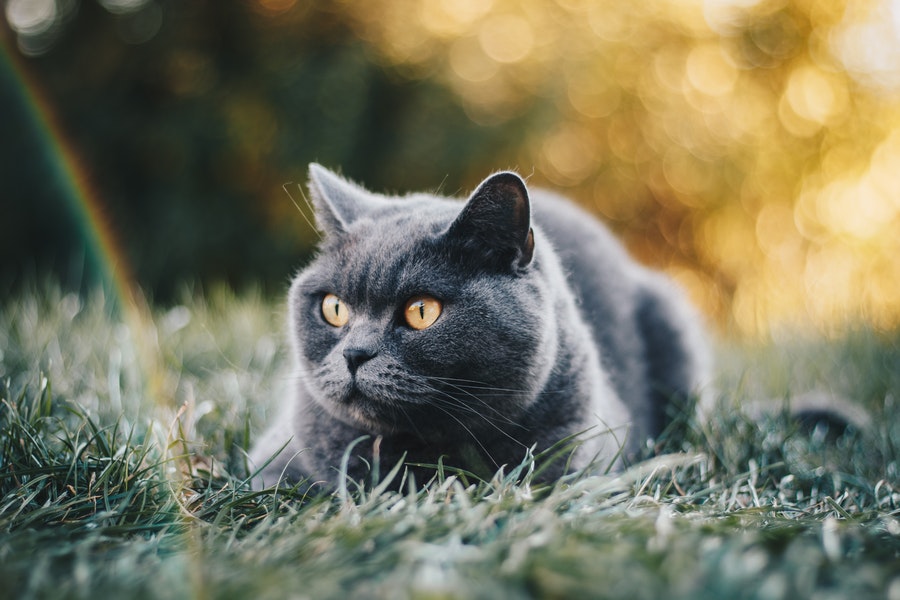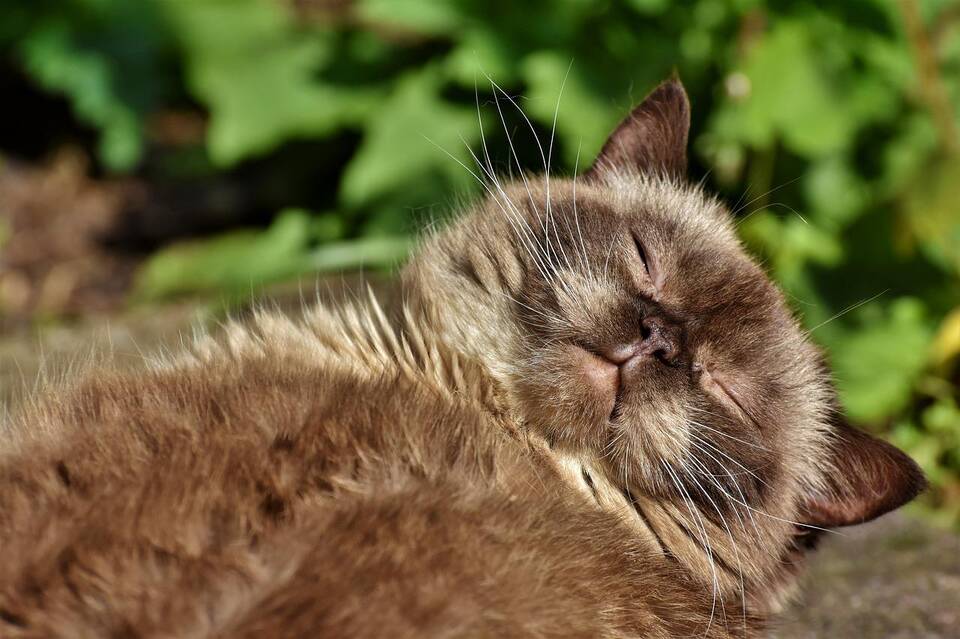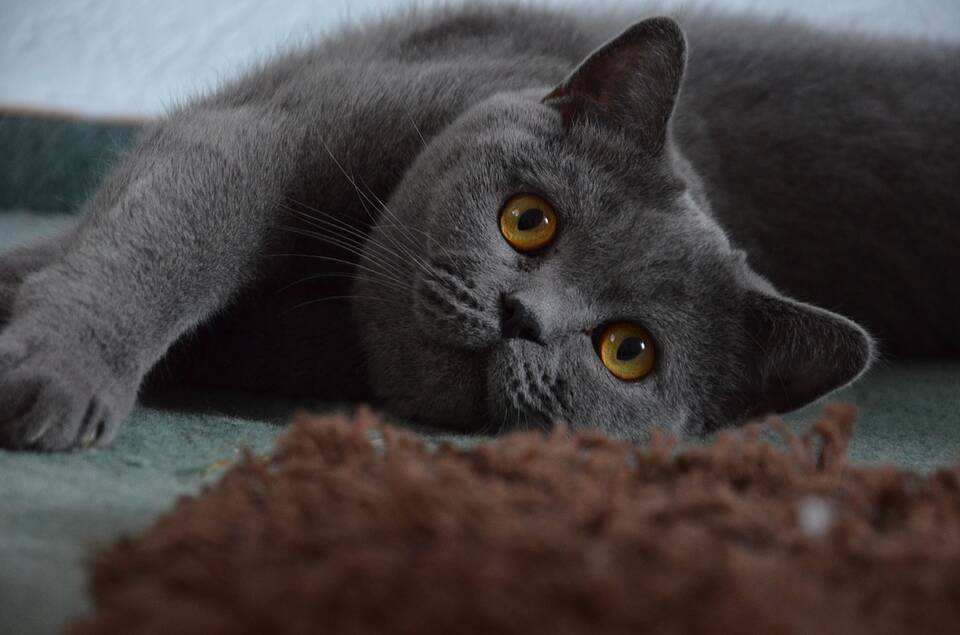Do you suffer from allergies? If so, you may be wondering if cats are a good option for you. While all cats produce dander, some breeds are considered to be hypoallergenic. Let’s find out the answer to the question: Is a British Shorthair cat hypoallergenic?
Keep reading to find out everything you need to know.
Are British Shorthair Cats Hypoallergenic?
British Shorthair cats are not hypoallergenic. Even though their fur looks short it’s very full and thick so tends to shed quite a lot. As with all cats, BSHs produce just as much as allergens as any other cat. What’s causing the allergic reaction isn’t the fur. It’s the presence of Fel d1 in their saliva and dander. Read on to find out more.
Why Are People Allergic To Their Feline Friends?
People can be allergic to anything. However, the reason people are allergic to cats is due to a protein called Fel d1.
It’s found in cat saliva and dander (dead skin cells). When a cat licks its fur it transfers saliva onto the coat.
As the cat grooms, it swallows some of the Fel d1 protein which is then secreted in its feces.
Dander is also responsible for allergies as it’s constantly shed from the cat’s skin.
It contains small amounts of Fel d1 protein too. The biggest problem with dander is that it’s very light and airborne so can be breathed in easily by allergy sufferers.
Allergies aren’t just caused by direct contact with a cat either.
If you’re allergic to cats, you can also have a reaction from touching something that a cat has been in contact with such as their bedding, food bowl, or litter tray.
So next time you start to sneeze around your British Shorthair cat, you know why!
How Do I Know If I’m Allergic?
If you think you may be allergic to cats the best thing to do is to visit your doctor.
They will be able to carry out tests to see if you are indeed allergic.
Once they have diagnosed you, they will be able to advise on the best course of treatment which may include medication or immunotherapy.
Allergy Symptoms
The symptoms of a cat allergy are similar to those experienced with other allergies such as hayfever.
They can include:
- Sneezing
- Itchy, watery eyes
- Runny nose
- Coughing
- Shortness of breath
- Wheezing
- Hives
- Swelling of the face, lips, or tongue
If you experience any of these symptoms after coming into contact with a cat, it’s best to seek medical advice.
If you establish that you have an allergy to cats, not to worry.
We have some tips that you can follow to help you live with a cat while having allergies.
Tips For Living With A British Shorthair And Allergies
There’s no sure-fire way to eliminate allergies but there are things you can do to help reduce them.
- Wash your hands after petting a cat
- Use a vacuum cleaner with a HEPA filter
- Don’t let cats into your bedroom
- Vacuum regularly and dust surfaces using a damp cloth
- Keep windows and doors closed to stop dander from coming into the house
- Change your clothes after being around cats
- Consider getting an air purifier
- Buy an enclosed cat tray to prevent dander from spreading.
You should also be brushing your British Shorthair cat regularly as part of their routine.
Check out our other article if you want to learn the best grooming routine for your British Shorthair.
Do British Shorthairs Shed Less Than Other Breeds?
As we’ve already established, all cats shed. The amount they shed depends on the individual cat, their diet, healthcare, and environment.
Some British Shorthairs do seem to shed less than other breeds but this isn’t always the case.
All Shorthair cats shed so this is unavoidable if you are thinking of adding one to your home.
If you’re looking for a cat that sheds less, it’s best to speak to a breeder about which of their cats is the best option for you.
What Is The Least Allergenic Breed?
There is no such thing as a hypoallergenic cat breed but there are some breeds that are considered to be less allergenic than others.
These include the Siberian, Bengal, Cornish Rex, and Devon Rex.
The best way to find out if you’re allergic to a particular breed of cat is to spend time with them and see how you react.
Remember, it’s not just the fur that can cause an allergic reaction so even if a cat doesn’t shed much, they could still be a problem for you.
Can You Be Allergic To One Cat And Not Another?
Yes, it’s possible to be allergic to one cat and not another. This is because each cat produces different levels of Fel d1 protein.
It’s also down to individual tolerances. Some people may be more sensitive to the protein than others.
The only way to find out if you’re allergic to a specific cat is to spend time with them and see how you react.
If you have severe allergies, it’s best to err on the side of caution and avoid them altogether.
Hypoallergenic British Shorthair? Is It Possible?
As we discussed earlier, there is no such thing as hypoallergenic cats. There are some breeds that are reported to cause fewer reactions to people who may have a cat allergy.
People who keep a British Shorthair around their homes know they tend to drop a lot of fur. So the answer is no, there is no such thing as a hypoallergenic British Shorthair.
Conclusion
We hope that this article has helped to clear up any confusion surrounding the term ‘hypoallergenic’, and answered the question: Is A British Shorthair Cat Hypoallergenic?
In short, the answer is no. A British Shorthair is not a hypoallergenic cat.
However, it doesn’t mean you can’t keep one in your home if you follow our helpful tips above.
Or maybe try a less furry cat breed to reduce the number of allergens in the air.
Elliot is the owner and lead writer at Lais Lairs. He is the proud owner of a Maine Coon/Siberian Mix cat named Lai. His oldest cat lived to be 18 years old so he’s learned a thing or two about keeping pets. When he’s not writing you can find him playing video games or playing fetch with Lai.



